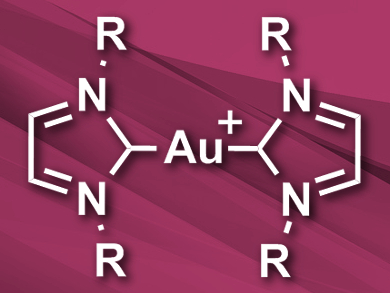Transition metal complexes with N-heterocyclic carbene (NHC) ligands are widely used catalysts. Gold-NHC complexes, in particular, are stable in air and in solution and have promising biological properties, as well. Gold(I) complexes with two NHC ligands (pictured) can be synthesized by transmetallation of the corresponding silver complexes or by ligand substitution at gold complexes. However, silver complexes are light sensitive and other approaches need strong bases which require an inert atmosphere or require multiple steps.
Sara A. Cortes-Llamas, Universidad de Guadalajara, Mexico, and colleagues, have developed a one-pot method for preparing [Au(NHC)2]+ complexes that uses metallic gold as a starting material. The team combined powdered gold, different imidazolium salts as NHC precursors, and CuSO4 in an acetonitrile and aqueous ammonia solution at 80 °C. The copper salt acts as an oxidizing agent and forms bis(NHC)-Cu(I) complexes, which are then transmetalated to give the corresponding gold complexes.
The method can be used for the synthesis of a range of cationic bis(NHC)-Au(I) complexes, including both well-known and new species. The approach avoids the use of silver salts and the isolation of intermediates, can be carried out under air, and, according to the researchers, is more efficient than currently used processes.
- From metallic gold to [Au(NHC)2]+ complexes: An easy, one-pot method,
Leticia Lozada-Rodríguez, Benito Pelayo-Vázquez, Irma Idalia Rangel-Salas, José G Alvarado–Rodríguez, Alejandro Aarón Peregrina-Lucano, Armando Pérez-Centeno, Fernando A. López-Dellamary Toral, Sara Angelica Cortes-Llamas,
Dalton Trans. 2017.
DOI: 10.1039/c7dt00322f




